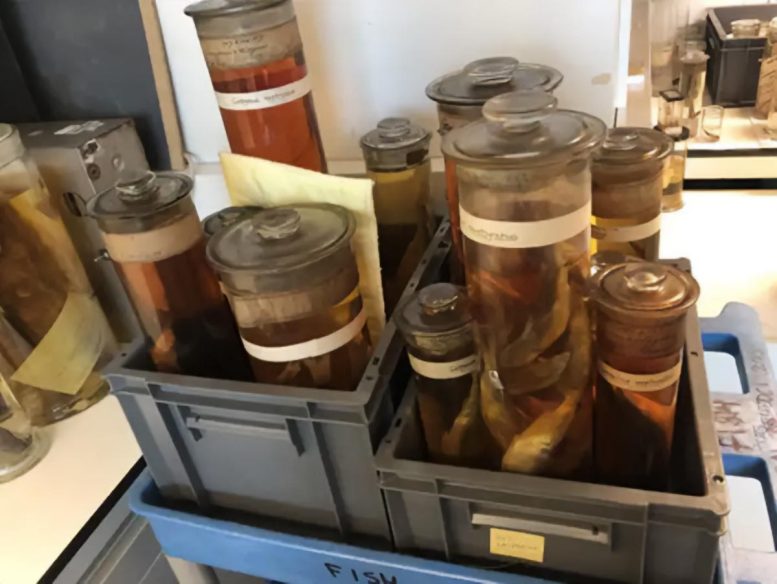
‘Extinct’ houting from the collection of the Natural History Museum London. Credit: Ymke Winkel
The houting fish, once thought extinct, is still thriving, as revealed by DNA comparisons with the European whitefish by researchers from the University of Amsterdam and the Natural History Museum London.
The houting, a fish species that lived in North Sea estuaries and is officially extinct, turns out to be alive and well. Researchers from the University of Amsterdam and the Natural History Museum London extracted DNA from multiple houtings conserved in the museum, up to 250+ years old. Next, they compared the DNA of these museum fish with DNA from various currently occurring sibling species. The biologists found hardly any genetic difference between houting and a species called European whitefish. Since this species is still common, houting also isn’t extinct.
DNA Research and Findings
In a study that was recently published in the journal BMC Ecology and Evolution, the scientists describe how they isolated mitochondrial DNA from the fish. They even managed to obtain a small piece of DNA from a dried North Sea houting from 1754 that was used by Linnaeus for the official species description. Next, the researchers used the DNA to create a phylogenetic tree, in which all examined houting (Coregonus oxyrinchus) ended up in the same group as the European whitefish (Coregonus lavaretus).
Not Extinct
According to the research team, houting is therefore not a separate species. First author Rob Kroes of the University of Amsterdam comments: “The European whitefish is fairly widespread in Western and Northern Europe, both in freshwater rivers and lakes, estuaries and the sea. Because we found no species difference between houting of the past and today’s European whitefish, we do not consider the houting to be extinct.”
External Traits vs. DNA
So, how is it possible that the houting was officially declared extinct in 2008? Kroes explains, “It often happens that there is confusion as to whether animals are one species or not. Especially when fish are involved. They often have a lot of variation in morphological traits within a species. In this case, biologists long thought that houting is a different species from the European whitefish due to the length of the snout and the number of gill rakers. But these traits are simply not suitable to say that houting is a different species. Our DNA research now clearly shows that it isn’t.”
Impending Name Revision
A change of the official Latin species name seems to be in order. However, a definitive adjustment of the name requires a bit of additional research on the DNA of the dried fish from 1754. According to the researchers, this will be difficult to do.
Kroes concludes: “The DNA is old and damaged, but I think we should try. At the moment, the protected status of various coregonids is a mess. According to the IUCN, North Sea houting is extinct; at the same time, there are various European nature laws that state that both houting and European whitefish must be protected. So we are actually protecting an extinct species that is just swimming around at the moment.”
Reference: “Phylogenetic analysis of museum specimens of houting Coregonus oxyrinchus shows the need for a revision of its extinct status” by R. Kroes, Y. Winkel, J. A. J. Breeuwer, E. E. van Loon, S. P. Loader, J. S. Maclaine, P. F. M. Verdonschot and H. G. van der Geest, 27 September 2023, BMC Ecology and Evolution.
DOI: 10.1186/s12862-023-02161-7









Is DNA the definition of speciation? Considering the definition of speciation, expound on the prior question using Poecilia reticulata (guppy) and Poecilia wingei (Endler’s Livebearer), because these two can and do interbreed successfully with fertile offspring. What makes a species — morphological differences like color and gill count? More depth to articles like this would be helpful educate (and less emphasis on spectacle).